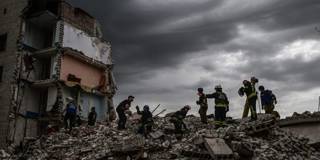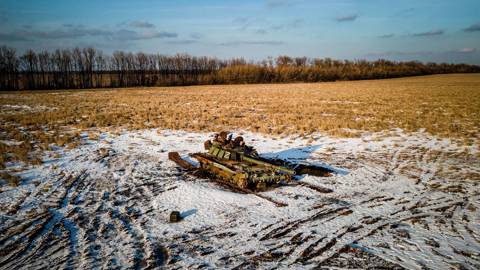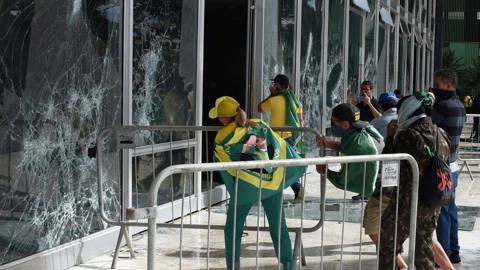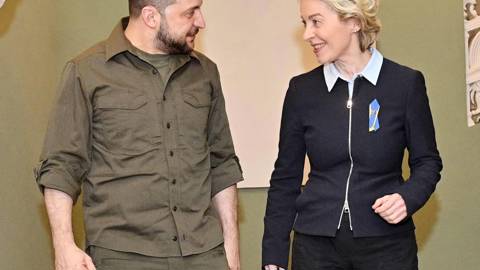How the world responds to Russia's war of aggression against Ukraine will have far-reaching implications for global peace and cooperation well into the future. Whatever the eventual negotiated outcome, the peace must be just and it must uphold the core principles of the international order.
HELSINKI – In October 2022, a large majority of United Nations member states voted in support of a resolution condemning Russia’s war of aggression against Ukraine and its illegal attempts to annex Ukrainian territory. Now, the international community must increase the pressure on the Kremlin by helping Ukraine maintain an effective defense capacity and tightening sanctions (including by closing current loopholes).
Finland’s own support for Ukraine rests on the principle enshrined in Article 51 of the UN Charter, which recognizes an “inherent right of individual or collective self-defense if an armed attack occurs against a Member of the United Nations, until the Security Council has taken measures necessary to maintain international peace and security.” Not only does Ukraine have a right to defend itself, but Finland and other UN members have a right to assist Ukraine in its efforts.
While Russia has paralyzed the Security Council with its veto, the broader UN nonetheless has demonstrated its ability to act, with the General Assembly taking center stage and condemning Russian aggression through numerous resolutions. UN agencies have delivered humanitarian aid to victims on the ground and stepped in to unlock shipments of grain and fertilizer through the Black Sea Grain Initiative. Similarly, the International Atomic Energy Agency is talking to both sides in its efforts to maintain nuclear safety. All these negotiation tracks, along with successful prisoner-exchange agreements, offer glimmers of hope for international diplomacy.
Yet, beyond Europe, Russia is pushing its own tendentious narratives and seeking to divide countries and regions that might otherwise be partners. In response to other countries’ provision of support to Ukraine, the Kremlin continues to threaten the rest of the world with food and energy insecurity. The Russian disinformation machine diverts attention from Russia’s own violations of international law and the rules and norms underpinning global order. To counter this, we must strengthen cooperation and partnerships between countries, recognizing that facts are the best weapons we have against disinformation.
And those facts are clear. Russia – and Russia alone – chose this war instead of pursuing dialogue and diplomacy. And it is Russian aggression – not outside support for Ukraine – that is causing or exacerbating food crises in Africa and elsewhere. Moreover, Russia has knowingly adopted methods of warfare that systematically violate the rules of engagement and international humanitarian law. Russian forces are deliberately targeting civilians and critical infrastructure – including by bombing hospitals, schools, and kindergartens – as well as forcibly transferring Ukrainian civilians across the border to Russia. These all amount to war crimes.
Following its many failures on the battlefield during the first year of the war, Russia may ultimately try to achieve a long, frozen conflict that allows it to occupy at least some Ukrainian territory. But all wars end eventually, and in this case, accountability for Russia’s war crimes and devastation of a neighboring country will be a crucial pillar in any lasting political settlement. Peace without justice is not sustainable.
To be sure, any eventual negotiations will probably unfold in a context of deep distrust between the parties. We Finns have experience in such matters, owing to our own history of confronting Soviet aggression. At a minimum, Ukraine will need strong international security guarantees of the kind that Ukrainian President Volodymyr Zelensky has proposed in his peace formula.
And make no mistake: pressuring Ukraine to accept an agreement against its will would have serious global consequences. Russia would conclude that aggressive warfare should remain in its geopolitical toolbox. After a few years have passed and it has regained its military strength, it might double down and assert new territorial claims in Europe and Eurasia as it continues to stir up conflicts in Africa and elsewhere.
Moreover, an unjust peace would fuel hatred, resentment, and revanchist tendencies in Ukrainian society, hampering reconstruction and reconciliation, while Russian society would once again be spared from having to engage in sorely needed self-reflection. At the same time, tensions in Europe and around the world would remain high, undercutting global economic development efforts as well as international cooperation on other crucial issues.
More broadly, Russian disregard for international law would cast serious doubt on the viability of the twenty-first-century rules-based international order. If a nuclear-armed permanent member of the UN Security Council can invade a sovereign country and unilaterally annex its territories, the existing order will have failed its biggest test.
The implications could be profound. We could be entering a new age of increasingly frequent nuclear blackmail and deepening insecurity, and we would be in a far worse position to tackle shared existential threats such as climate change, biodiversity loss, and pandemics.
We absolutely must strengthen our collective efforts to support rules-based global governance, and I remain confident that we will succeed. The international order still enjoys broad-based support across countries and peoples.
Finnish support for Ukraine will remain firm. By helping the Ukrainians defend themselves, we are also defending the right of sovereign states to exist, the freedom of all countries to choose their friends and allies, and the rules-based multilateral order itself.
Europe’s peace rests on the idea that all states should be able to choose their own security arrangements – a principle to which Russia itself has agreed. Finland recently exercised this right by joining NATO. Membership in the alliance will help preserve our own security in what is now a changed geopolitical landscape; it is neither a provocation nor a threat against Russia. Finland will continue to provide security and work for peace, only now it will do so from within NATO.
Collective, coherent, and determined forms of pressure will be required to stop Russian aggression and uphold the international rule of law. Russia can end the war that it started at any time, simply by withdrawing its troops from Ukrainian territory. The ball is in its court.






HELSINKI – In October 2022, a large majority of United Nations member states voted in support of a resolution condemning Russia’s war of aggression against Ukraine and its illegal attempts to annex Ukrainian territory. Now, the international community must increase the pressure on the Kremlin by helping Ukraine maintain an effective defense capacity and tightening sanctions (including by closing current loopholes).
Finland’s own support for Ukraine rests on the principle enshrined in Article 51 of the UN Charter, which recognizes an “inherent right of individual or collective self-defense if an armed attack occurs against a Member of the United Nations, until the Security Council has taken measures necessary to maintain international peace and security.” Not only does Ukraine have a right to defend itself, but Finland and other UN members have a right to assist Ukraine in its efforts.
While Russia has paralyzed the Security Council with its veto, the broader UN nonetheless has demonstrated its ability to act, with the General Assembly taking center stage and condemning Russian aggression through numerous resolutions. UN agencies have delivered humanitarian aid to victims on the ground and stepped in to unlock shipments of grain and fertilizer through the Black Sea Grain Initiative. Similarly, the International Atomic Energy Agency is talking to both sides in its efforts to maintain nuclear safety. All these negotiation tracks, along with successful prisoner-exchange agreements, offer glimmers of hope for international diplomacy.
Yet, beyond Europe, Russia is pushing its own tendentious narratives and seeking to divide countries and regions that might otherwise be partners. In response to other countries’ provision of support to Ukraine, the Kremlin continues to threaten the rest of the world with food and energy insecurity. The Russian disinformation machine diverts attention from Russia’s own violations of international law and the rules and norms underpinning global order. To counter this, we must strengthen cooperation and partnerships between countries, recognizing that facts are the best weapons we have against disinformation.
And those facts are clear. Russia – and Russia alone – chose this war instead of pursuing dialogue and diplomacy. And it is Russian aggression – not outside support for Ukraine – that is causing or exacerbating food crises in Africa and elsewhere. Moreover, Russia has knowingly adopted methods of warfare that systematically violate the rules of engagement and international humanitarian law. Russian forces are deliberately targeting civilians and critical infrastructure – including by bombing hospitals, schools, and kindergartens – as well as forcibly transferring Ukrainian civilians across the border to Russia. These all amount to war crimes.
Following its many failures on the battlefield during the first year of the war, Russia may ultimately try to achieve a long, frozen conflict that allows it to occupy at least some Ukrainian territory. But all wars end eventually, and in this case, accountability for Russia’s war crimes and devastation of a neighboring country will be a crucial pillar in any lasting political settlement. Peace without justice is not sustainable.
SPRING SALE: Save 40% on all new Digital or Digital Plus subscriptions
Subscribe now to gain greater access to Project Syndicate – including every commentary and our entire On Point suite of subscriber-exclusive content – starting at just $49.99.
Subscribe Now
To be sure, any eventual negotiations will probably unfold in a context of deep distrust between the parties. We Finns have experience in such matters, owing to our own history of confronting Soviet aggression. At a minimum, Ukraine will need strong international security guarantees of the kind that Ukrainian President Volodymyr Zelensky has proposed in his peace formula.
And make no mistake: pressuring Ukraine to accept an agreement against its will would have serious global consequences. Russia would conclude that aggressive warfare should remain in its geopolitical toolbox. After a few years have passed and it has regained its military strength, it might double down and assert new territorial claims in Europe and Eurasia as it continues to stir up conflicts in Africa and elsewhere.
Moreover, an unjust peace would fuel hatred, resentment, and revanchist tendencies in Ukrainian society, hampering reconstruction and reconciliation, while Russian society would once again be spared from having to engage in sorely needed self-reflection. At the same time, tensions in Europe and around the world would remain high, undercutting global economic development efforts as well as international cooperation on other crucial issues.
More broadly, Russian disregard for international law would cast serious doubt on the viability of the twenty-first-century rules-based international order. If a nuclear-armed permanent member of the UN Security Council can invade a sovereign country and unilaterally annex its territories, the existing order will have failed its biggest test.
The implications could be profound. We could be entering a new age of increasingly frequent nuclear blackmail and deepening insecurity, and we would be in a far worse position to tackle shared existential threats such as climate change, biodiversity loss, and pandemics.
We absolutely must strengthen our collective efforts to support rules-based global governance, and I remain confident that we will succeed. The international order still enjoys broad-based support across countries and peoples.
Finnish support for Ukraine will remain firm. By helping the Ukrainians defend themselves, we are also defending the right of sovereign states to exist, the freedom of all countries to choose their friends and allies, and the rules-based multilateral order itself.
Europe’s peace rests on the idea that all states should be able to choose their own security arrangements – a principle to which Russia itself has agreed. Finland recently exercised this right by joining NATO. Membership in the alliance will help preserve our own security in what is now a changed geopolitical landscape; it is neither a provocation nor a threat against Russia. Finland will continue to provide security and work for peace, only now it will do so from within NATO.
Collective, coherent, and determined forms of pressure will be required to stop Russian aggression and uphold the international rule of law. Russia can end the war that it started at any time, simply by withdrawing its troops from Ukrainian territory. The ball is in its court.